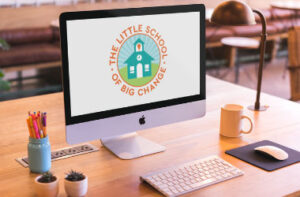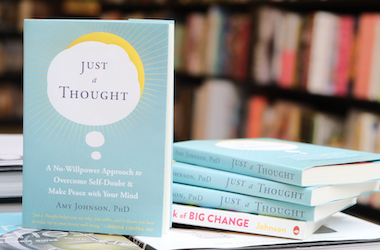In this article, we’ll look at how you can view and handle emotions, as well as what you can come to realize, that can help you stop binge eating.
How to Handle Emotion to Stop Binge Eating

Binge eating is not always or only a response to food deprivation and dieting. We often binge eat for the same reason we have any habit–to avoid feeling uncomfortable emotions.
All habits, in one way or another, are an attempt to avoid a feeling. Therefore, a huge part of helping yourself stop binge eating involves becoming comfortable with thoughts and feelings. When we see that feelings are safe and we’re open to feeling what arises, habits have no purpose. If there is nothing we need to avoid, there is no need for a habit.
What is a Feeling?
The word emotion comes from the phrase “energy in motion”. A feeling or emotion has two parts to it. First, there is some energy in motion–some sensations that we feel physically. Second, there are the labels and stories our mind attaches to that energy.
For example, a heavy sensation in your chest along with some sad thoughts might be experienced as sadness or grief. A fluttery feeling in your stomach with some fast, worried thoughts might be called anxiety.
Fluctuating energy isn’t good or bad, comfortable or uncomfortable, in and of itself. It’s just energy. The stories and labels our mind attaches to that energy is what leads us to like or dislike what we feel.
Leaning In
All feelings are safe. It can feel like emotion will overwhelm us. Emotion can appear incredibly unsafe or uncomfortable, but it’s important to see that even though they may feel that way, they are not that way.
Much of what makes emotions feel so horrible is our fear and resistance. We do all sorts of things to avoid feeling, including binge eating and other habits, distraction, or internally shutting down and trying to not feel so much. When we resist emotion, we prolong our fear and emotions end up feeling even things even more strongly.
Seeing that all feelings are completely safe and that they come and go completely on their own is a huge part of allowing yourself to feel them. It feels amazing to lean into what’s arising, rather than trying to lean away from it.
Urges to Binge Eat are Feelings Too
Urges to binge eat are no different from other feelings or emotions. You feel physical sensations plus a barrage of images, stories, memories and demands that your mind attaches to those sensations. It is easier to stop binge eating when we see these urges in a new light.
Your brain produces urges to binge eat for many reasons. As we’ve already seen, sometimes it’s purely as a survival mechanism if you’ve been physically or mentally depriving yourself food. Sometimes it’s as a habitual way to numb or distract from an emotion that feels too uncomfortable to feel. Other times it may be in response to a “match”–maybe you’re in a situation where you’ve binged before, or you have a food you’ve binged on in the past. In this case, your brain is simply producing an urge to binge eat because it detects a match.
You Don’t Have to Act
Your brain isn’t producing these urges because you’re actually supposed to binge eat; it’s simply doing what it has been reinforced for in the past. Just because an urge is showing up does not mean you have to act on it. I’m not talking about fighting an urge with willpower; I’m talking about seeing it as the conditioned, temporary, safe reaction it is and simply letting it come and go. No urge or emotion can make you do anything. All thoughts and feelings end on their own, especially when we lean into them and feel them rather than try to push them away.
Start Small
It’s best to practice leaning into feelings that don’t feel quite as overwhelming as an urge to binge feels. Start by feeling nervousness, disappointment, frustration, sadness, or embarrassment as they naturally arise in your day. These are safe, normal experiences.
Notice how they feel, and where you feel them physically. Notice the stories, memories, and thoughts that arise along with the energy. See that you are not these feelings; you are the one who is aware of them. You can notice them from a place of safe, neutral awareness.
Start small, with emotions that feel easier to be with, and your natural ability to lean into bigger emotions and urges will grow.
What to Realize to Stop Binge Eating
There are many insights you can have that go a long way toward complete freedom from binge eating. Below are just some of the insights that have been most helpful to me and my clients and students.
You are Habit-free by Nature
Your binge eating habit was learned. You weren’t born doing this habit and even today, there are many moments in every day when binge eating is not a part of your life at all.
You are habit-free by nature, no matter how long you’ve been gripped by binge eating. The habit consists of habitual thoughts and feelings that move through, that appear solid and personal and are often acted upon. But as you’ve seen, those thoughts and feelings aren’t you and they aren’t ‘yours’; they have only appeared that way. All experience, even binge urges, come and go on their own. As you begin to relax around all experience, it flows more easily and changes on its own, revealing your habit-free nature.
Familiar Thoughts and Feelings May Return
It makes perfect sense that thoughts about binge eating or a desire to binge eat might show up after a period of freedom. This means absolutely nothing about you or your ability to overcome binge eating permanently. It’s only a reflection of your brain having a habit of producing those thoughts.
If you lived in a house for 10 years and then moved to a new house across town, you might accidentally drive to your new house after work one day out of habit. That wouldn’t mean you’re meant to live in that house forever! In the same way, having thoughts or urges around binge eating doesn’t mean anything about you or your future with this habit.
Being Completely Free of Binge Eating is not Only Possible, it’s Likely
People find complete freedom from binge eating all the time. Years ago in traditional therapy, I was told I’d likely have to manage or cope with binge eating forever. That when I was under stress in the future, binge eating was likely to arise.
That’s not true for me today, and it’s not true for many of the people I’ve worked with. You are free already…you’re simply identified with passing, habitual urges that feel compelling enough to act on. Freedom is not about never binge eating again, although that happens for people. It’s about feeling free to nourish your body easily and confidently lean into any feelings that arise.
Find a Community
You don’t have to try to stop binge eating on your own. There is amazing professional support available from practitioners and Change Coaches who have overcome binge eating themselves and who are professionally trained in how to support people.
In addition to professional support, being in a community can make a world of difference. Being around others who are in the process of stopping binge eating or who have already stopped can help you see things you can’t necessarily see on your own. You are not alone.
You can read about how to eat to stop binge eating in our other article.
About the Author
Amy Johnson, PhD is a psychologist, coach, author, and speaker who shares a groundbreaking new approach that helps people find lasting freedom from unwanted habits, anxiety, and self-doubt via insight rather than willpower.
She is the author of Being Human, The Little Book of Big Change: The No-Willpower Approach to Breaking Any Habit, and Just a Thought: A No-Willpower Approach to End Self-Doubt and Make Peace with Your Mind. In 2017 she opened The Little School of Big Change, an online school that has helped thousands of people find freedom from anxiety and habits and live a more peaceful life.
Amy also shares the no-willpower approach in her top-rated podcast, Changeable, and she’s trained over 70 coaches in her Change Coach Training Program. She has been a regularly featured expert on The Steve Harvey Show and Oprah.com, as well as in The Wall Street Journal and Self magazine.
If you are looking for help to stop binge eating, please check out The Little School of Big Change. There is a self-study version that you can do at your own pace and there is a guided version where Dr. Amy supports people for 6 weeks. There is also an incredible community around The Little School of Big Change that you can be part of once you’ve been through the course.







